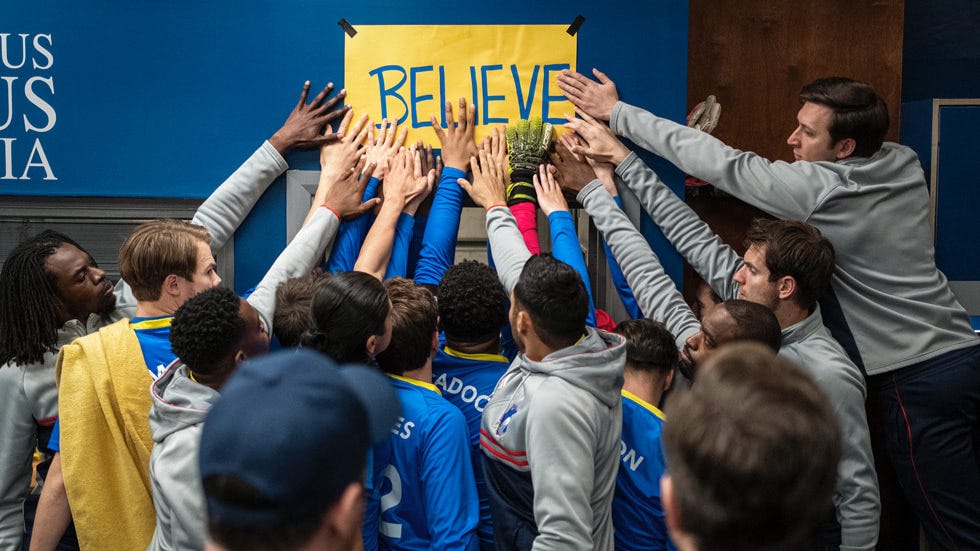How Ted Lasso Leadership Stacks Up to the Best Anti Heroes
Exploring Coach Lasso's unique workplace and a leadership style rare on TV
Everyone loves Ted Lasso, don’t they? When the final season premiere date was announced, there was a flood of enthusiasm for the next installment coming on March 15, 2023. Why is this show so well-liked? Is it because it premiered during a time of global uncertainty, with audiences craving feel-good comedy? Is it because we generally love an inspiring sports-themed story, especially when there’s an underdog and more than just the sport? Is it because Roy Kent is so angry all the time it’s hilarious? Or is it because Coach Lasso himself is such a deeply good person, and a great leader, that we can’t help but look up to him? It's no surprise that Ted Lasso watch parties are becoming increasingly popular as fans form their own small teams to soak up his wisdom and eagerly await that final season.
Coach Lasso has become a role model to many of us with his leadership style. Since the series premiered on Apple Plus in the Summer of 2020, scores of articles have been written about how we all could be more like Ted. A quick google search for “Ted Lasso leadership” or “Ted Lasso management” reveals a wealth of positive lessons one can gain from Ted Lasso to use in the workplace and life. But the lessons we learn from fictional characters in many popular franchises run the gamut, and often these characters are anti heroes. Ted Lasso, on the other hand, offers fresh takes on leadership, friendship, and life—without many caveats.
Lessons from Anti Heroes
TV shows can provide leadership and management lessons to employ in our jobs, even if they come from questionable characters. One can look to Game of Thrones for various management styles and tactics from both anti heroes and villains. Are you a Cersei using fear and manipulation to hold onto authority? Or are you a Daenerys Targaryen, using charisma and drastic decision-making skills in a crisis? Proclaimed criminals in shows Breaking Bad or Orange is the New Black sell us on their pragmatic problem-solving skills that can be useful in any workplace. One of the great TV anti heroes, The Sopranos mob boss Tony Soprano, showed how important it is for leaders to think one step ahead and make swift decisions. And Mad Men’s advertising executive Don Draper might not have been a model husband or friend, but in the workplace, he was a solid mentor who could effortlessly change the conversation if he didn’t like what was being said. But while we can learn from these leaders, we probably don’t want to be like them all around, what with criminal activity, jail stints, dragon-slaying, etc.
Bad bosses on TV
On the other hand, the television landscape is littered with less controversial characters who are simply bad bosses. Their cringe-worthy mistakes are what usually make them so fun to watch. The unwavering fandom surrounding The Office might have something to do with why one of the worst managers we could fathom, Michael Scott, is still so beloved. What he lacks in tact, skill, and charisma, he makes up for in heart. And we love that about him, even while taking notes on what to avoid ever doing ourselves. Emily Gilmore employs many, many housekeepers on Gilmore Girls. Fans adore her searing wit and fierce love of her family, but her unreasonable expectations of those who work for her paint an insensitive boss at best. Abbott Elementary’s Principal, Ava Coleman, is a terrible leader. Not only did she obtain the job under questionable circumstances, she doesn’t even have the interests of her faculty or the students at heart. But are her selfish antics hilarious to watch? Absolutely. Even plucky Leslie Knope from Parks & Recreation isn’t a typical good leader, especially when her unbridled passion gets in the way of getting things done.
Ted Lasso is different
What’s different about Ted Lasso is that in this workplace, the title character seems to have it all: he’s entertaining, generous, AND a great leader. And he’s not alone: Coach Beard imparts quiet leadership, always serving Ted as a sympathetic friend and guide while educating himself (and Ted) on the customs of the country and the sport they have found themselves a part of. Viewers have even taken note of Coach Beard’s affinity for reading, gleaning management tips from the books he’s often seen holding scene to scene. And we cannot forget Rebecca, a leader who isn’t above apologizing when she’s made a mistake, which is a leadership skill even some of the best bosses fail to learn. Roy Kent emerges as a team leader and imparts life lessons, proving that encouragement can come from unlikely places as his grumpy demeanor slowly turns to reluctant warmth for the players around him.
What are some of Ted’s leadership lessons? In case you haven’t seen the show, here are a few:
On morals, he believes in doing what’s right, no matter what. He benches Jamie Tartt for poor sportsmanship during a critical game, even though it could mean a loss for the club. It sends a message to the other players: there is no “i” in “team.”
He strives for transparency and always tells the truth (sometimes to humorous or awkward effect). Ted tells Rebecca, his new English boss, how much he hates tea; his honesty is unthreatening and shows how comfortable he is with being truthful.
He never stops learning and loves soaking up knowledge from those around him. This is an important and often overlooked leadership skill. For example, he learns everyone’s name, no matter their rank (notably, he asks Nate’s name within the first half of the pilot episode).
Ted also empowers others around him to lead; he isn’t threatened by players showing leadership on the field or off. When Roy Kent joins the coaching staff post-retirement, Ted lets him lead in his own way rather than control his tactics.
Of course, he also loves his mantras, like “be a goldfish.” Goldfish, he explains, have a 10-second memory and, therefore, always move forward without dwelling on past mistakes. And you can’t escape the giant “Believe” poster above his office door: Ted Lasso believes in “Believe” above all else. (It’s his version of “clear eyes, full hearts, can’t lose," the singular mantra from beloved Friday Night Lights’ Coach Taylor.) You can always rely on episodes packed with practical and often inspirational locker room advice from Roy Kent, Ted Lasso, Coach Beard, and others.
Ted isn’t without his faults, of course. He struggles with personal problems, like his relationship woes and mental health, relying on those inspirational mantras instead of hard science to help himself. Those mantras may work on the field, but not so much during a panic attack. And some might find a character who is so consistently good to be annoying, even trite.
Still, Ted Lasso is an outlier: he is a leader who is a purely good guy and easy to root for. In an era when most beloved characters aren’t “good” or “bad” but lie on a more complicated human spectrum (The Last of Us has audiences debating Joel’s moral compass when survival is on the line), Ted is more straightforward than we might be used to. He’s the ultimate “comfort character,” and sometimes, it’s nice to take a character at face value. And who doesn’t like a good pep talk, right? So grab your team, and start planning that Ted Lasso watch party. Whether you dive into Season 3 as it drops or start the series over, TV’s favorite coach wants to put you in the game. Are you ready?
Find other fans of the series on our Discord! Head to our TV forums and search Ted Lasso to discuss your favorite moments from Seasons 1 and 2 and predictions for Season 3! And be sure to join us in the Remarkist app, where fans host watch parties of their favorite shows and movies daily.








